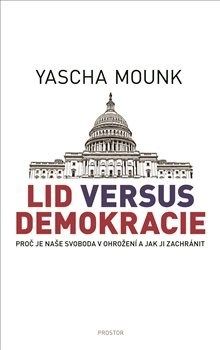Yascha Mounk
autor
Lid versus demokracie
Autoritářští populisté po celém světě od Indie po Turecko a od Polska po Spojené státy rozšiřují a upevňují svůj politický vliv a moc. Máme-li porozumět tomu, jak velkou hrozbu tento vývoj představuje a jak se mu lze bránit, musíme nejdříve pochopit příčiny atraktivity a stability, jimž se liberální demokracie po druhé světové válce v globálním měřítku těšila, a popsat tendence, jež tuto stabilitu v konečném výsledku narušily. Yascha Mounk spatřuje klíčový problém v odloučení obou bytostných složek liberální demokracie, tedy garantování lidských a občanských práv na jedné straně a schopnosti řídit se aktuální lidovou vůlí na straně druhé. Narušením rovnováhy, jež je pro liberální demokracii životně nutná, vznikají dvě problematické formy: nedemokratický liberalismus, v němž obyvatelstvo ztrácí vliv na počínání politických elit, a neliberální demokracie, v níž vůle lidu potlačuje práva jednotlivců a menšin.
Autor se snaží vystihnout specifické příčiny, jež posilují přitažlivost autoritářských programů, a navrhuje konkrétní kroky do budoucna, zahrnující též nastolení tolerantního, inkluzivního pojmu národa.
dostupné aj ako:
Lid versus demokracie
Autoritářští populisté po celém světě – od Indie po Turecko a od Polska po Spojené státy – rozšiřují a upevňují svůj politický vliv a moc. Máme-li porozumět tomu, jak velkou hrozbu tento vývoj představuje a jak se mu lze bránit, musíme nejdříve pochopit příčiny atraktivity a stability, jimž se liberální demokracie po druhé světové válce v globálním měřítku těšila, a popsat tendence, jež tuto stabilitu v konečném výsledku narušily. Yascha Mounk spatřuje klíčový problém v odloučení obou bytostných složek liberální demokracie, tedy garantování lidských a občanských práv na jedné straně a schopnosti řídit se aktuální lidovou vůlí na straně druhé. Narušením rovnováhy, jež je pro liberální demokracii životně nutná, vznikají dvě problematické formy: nedemokratický liberalismus, v němž obyvatelstvo ztrácí vliv na počínání politických elit, a neliberální demokracie, v níž vůle lidu potlačuje práva jednotlivců a menšin.
Autor se snaží vystihnout specifické příčiny, jež posilují přitažlivost autoritářských programů, a navrhuje konkrétní kroky do budoucna, zahrnující též nastolení tolerantního, inkluzivního pojmu národa.
Predaj skončil
9,59 €
dostupné aj ako:
The Great Experiment
One of our most important political thinkers looks to the greatest challenge of our time: how to live together equally and peacefully in diverse democracies. It's easy to be pessimistic about the fate of democracy in multi-ethnic societies. At the end of the Second World War, fewer than one in twenty-five people living in the UK were born abroad; now it is one in seven. The history of humankind is a story of us versus them, and the project of diverse democracies is a relatively new one - it is, in other words, a great experiment. How do identity groups with different ideologies and beliefs live together? Is it possible to embark on a democracy with shared values if our values are at odds? Yascha Mounk argues that group identity is both deeply rooted and malleable. No community is beyond conciliation: groups are moving towards cooperation across the world. The Great Experiment offers a profound understanding of the problem behind all our other problems, and genuine hope for our capacity to solve it.
Vypredané
15,68 €
16,50 €
The Identity Trap
One of our leading public intellectuals traces the origin of a set of ideas about identity and social justice that is rapidly transforming America—and explains why it will fail to accomplish its noble goals.
For much of history, societies have violently oppressed ethnic, religious, and sexual minorities. It is no surprise that many who passionately believe in social justice came to believe that members of marginalized groups need to take pride in their identity to resist injustice.
But over the past decades, a healthy appreciation for the culture and heritage of minority groups has transformed into a counterproductive obsession with group identity in all its forms. A new ideology aiming to place each person’s matrix of identities at the center of social, cultural, and political life has quickly become highly influential. It stifles discourse, vilifies mutual influence as cultural appropriation, denies that members of different groups can truly understand one another, and insists that the way governments treat their citizens should depend on the color of their skin.
This, Yascha Mounk argues, is the identity trap. Though those who battle for these ideas are full of good intentions, they will ultimately make it harder to achieve progress toward the genuine equality we desperately need. Mounk has built his acclaimed scholarly career on being one of the first to warn of the risks right-wing populists pose to American democracy. But, he shows, those on the left and center who are stuck in the identity trap are now inadvertent allies to the MAGA movement.
In The Identity Trap, Mounk provides the most ambitious and comprehensive account to date of the origins, consequences, and limitations of so-called “wokeness.” He is the first to show how postmodernism, postcolonialism, and critical race theory forged the “identity synthesis” that conquered many college campuses by 2010. He lays out how a relatively marginal set of ideas came to gain tremendous influence in business, media, and government by 2020. He makes a nuanced philosophical case for why the application of these ideas to areas from education to public policy is proving to be so deeply counterproductive—and why universal, humanist values can best serve the vital goal of true equality. In explaining the huge political and cultural transformations of the past decade, The Identity Trap provides truth and clarity where they are needed most.
Vypredané
36,58 €
38,50 €








